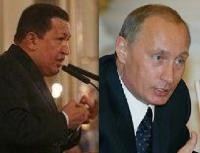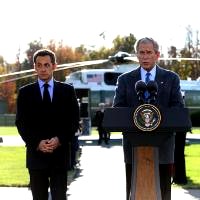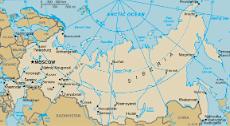After the Georgia War, I argued that whatever damage Russia had done to its international reputation could be recouped with a demonstration or two of reasonabless and responsibility. I expected the demonstration to come in Abkhazia and South Ossetia themselves, but I underestimated the degree to which the conflict with Georgia was “personal.” Instead, it looks like Russia has chosen the other two frozen conflicts of the region — the breakaway Moldovan province of Trans-Dniester and the breakaway Azerbaijan province of Nagorny Karabakh — to demonstrate that Abkhazia and South Ossetia were a one-off — Russia’s equivalent of the West’s […]
Russia Archive
Free Newsletter
Looks like Russia is about to suffer some more strategic fallout from the Georgia War, to the tune of $20-30 billion in direct and immediate loans to its oil industry from China. That, in return for guaranteed exports of two billion barrels a year for 20 years. Obviously, Beijing is having some trouble digesting Russia’s recognition of the separatist provinces. Seriously (or if not seriously, then with slightly less irony), it’s quite a bargain compared to what we’ve spent in Iraq securing our oil imports for the next twenty years. Moscow and Beijing are also talking about dispensing with the […]
A couple of articles in the French language press (one this weekend in Le Monde, the other today in Le Figaro) indicate that, contrary to what I’d expected, Russia is in fact annexing South Ossetia and Abkhazia on the installment plan. Apparently most of the political leaders installed in the two provinces are Russian (the new South Ossetian prime minister is a product of the Russian security forces), a rail bridge that linked the Abkhazia’s ethnically Georgian populaiton to Georgia has been blown up, and negotiations are under way for pemanent military bases. (I imagine that bargaining will be less […]

BOGOTÁ, Colombia — Venezuela’s strengthening military and diplomatic ties with Russia have led to alarmist headlines announcing the return of a Cold War standoff, and raising questions about the impact of Hugo Chávez’s arms shopping spree on the regional balance of power. But even with the latest arms purchases, Venezuela does not top the list of the region’s biggest military powers. Since 2005, Venezuela has spent over $4 billion on Russian hardware, including 24 Sukhoi fighter jets and dozens of combat helicopters. The purchase of over 100 T72 tanks to replace older French models is in the pipeline, say Venezuelan […]

Last week, the U.S. government completed one of the largest nuclear recovery operations in history when it helped relocate 341 pounds (154.5 kilograms) of highly enriched uranium — enough to construct six nuclear weapons — from a Soviet-era nuclear research reactor in Hungary to a more secure storage site in Russia. The operation was led by the National Nuclear Security Administration (NNSA), a semi-autonomous agency of the U.S. Department of Energy (DOE), and involved the cooperation of Russia, Hungary, Slovenia, the International Atomic Energy Agency (IAEA) and the Euratom Supply Agency. While lauding the Russian and American governments (.pdf) “for […]
I just got finished reading David Sanger’s NY Times article comparing the foreign policy positions of the two presidential candidates. Like David Shorr at Democracy Arsenal, I agree that it’s “probably the best stand-in we’ll get for the foreign policy debate that might’ve been,” and an illustration of how the much-derided written press can often confront candidates’ position more effectively than the presidential debate format, which veers towards the theatrical for obvious reasons. Like Shorr, too, I agree that John McCain’s late reversal on the acceptability of an NPT-compliant uranium enrichment program in Iran is probably closer to my own […]

THE INCREDIBLE SHRINKING SUMMIT — The Bush administration’s announcement of an emergency financial summit on Nov. 15 in Washington ruffled some international feathers, notably in Spain and France, but in other countries as well. The meeting of global leaders to address the current crisis and bring a measure of control to the unruly financial world was originally proposed last week by French President Nicolas Sarkozy. He pushed for the United Nations as the venue, and encouraged the widest possible participation. That’s not what the White House announced Wednesday. To the more or less private annoyance of the French, the White […]
Hard to know what went on in that high-level timeout in Helsinki the other day between JCS Chief Adm. Mike Mullen and his Russian counterpart, but I’d be surprised if today’s declaration by Russian FM Sergey Lavrov that Russia will not veto a UNSC resolution extending American troop presence in Iraq in the absence of a deal between Baghdad and Washington is just a happy coincidence. Mullen went on talk tough in Lithuania about the need to better integrate Baltic defense into NATO’s architecture. But the Baltic is already a done deal. To my mind, Russia’s major strategic blunder in […]
A number of very interesting aspects to this NY Times article on how the Goergia War has impacted Azerbaijan. First, it illustrates how the argument that Russia will pay a longterm cost for its belligerence, while valid, is limited to those countries (and investors) who have a choice as to whether or not they deal with Russia, or who have little to fear from Russia’s demonstrated willingness to use military force. As this article makes clear, Azerbaijan meets neither of those criteria, and so it’s not surprising that “the chess board has been tilted.” Second, while many analysts have focused […]
At the upcoming North Atlantic Treaty Organization summit in December, U.S. officials will once again make the case for admitting Georgia and Ukraine to the alliance. Our NATO allies, with Germany and France leading the way, already blocked the two countries’ path to membership last spring, a move that in retrospect might have prevented August’s dustup between Russia and Georgia from escalating into a nuclear standoff. Rather than being grateful to them, U.S. leaders are instead doubling down on folly. If the Bush administration gets its way, NATO will this time offer these nations Membership Action Plans, one of the […]
Nikolas Gvosdev, writing at the Atlantic Council, is the latest analystI’ve seen make the case that Cyprus — and not Kosovo — is theprecedent to study when considering the aftermath of the Georgia War. Sothe fact that Georgia-Russian talks may have broken down in Geneva maynot have much of an impact on Europe’s relations with Russia, just asnon-resolution of the Cyprus issue over the last three decades has notdramatically affected either the U.S. or European relationship withTurkey. In other words, we already have a precedent of the Westperfectly willing and able to compartmentalize such problems. Europeanstates can easily proclaim their […]

When Israeli Prime Minister Ehud Olmert traveled to Moscow earlier this month, he hoped to achieve three objectives: to ensure that Israel’s pre-August military ties with Georgia had not unduly damaged Russian-Israeli relations, to convince Russian policy makers not to provide Syria or Iran with advanced weapons that could be used against Israel, and to induce Russian leaders to pressure Tehran to moderate its nuclear ambitions. Olmert did not mention the Georgia issue at his public cabinet meeting prior to departure, saying only that he would discuss several subjects “that cause deep concern and require immediate action,” including Russian “arms […]

RUSSIAN RIGHTS DEFENSE A POISONOUS AFFAIR — In a twist that could have been lifted from the plot of a dime store spy novel, a Russian human rights lawyer prosecuting the case of an assassinated journalist missed pretrial hearings last week when she and members of her family fell ill after discovering a suspicious substance in their car. Karina Moskalenko has built a career participating in some of Russia’s most notorious cases, defending some of the Kremlin’s harshest critics along the way. Last week, she and her children fell ill with bouts of dizziness, headaches and nausea after discovering balls […]
Expect a lot of noise from the neo-Cold War alarmists about the Russia-Georgia talks in Geneva breaking down before they even started. Not a big deal, though. They’re rescheduled for a month form now, and time isn’t on the Russians’ side. Should they insist on holding onto the provinces, they will open themselves up to very easy asymmetric strikes (last week’s, for instance), of the sort that will eventually necessitate a full-scale invasion and occupation of all of Georgia. In other words, a total waste of resources while they’re trying to reestablish their rusting military (see Richard Weitz’ WPR column […]

The uncertainty that characterizes the current global financial crisis extends beyond the markets, and its drama beyond the erratic moves of securities prices. When the dust settles after this economic storm, power relations will also have changed. One of the great unknowns — and one that will mark the character of the post-crisis era — is whether the new Russia will emerge from the crisis fortified or weakened. To hear Russia’s current prime minister and still-strongman, Vladimir Putin, tell it, this dire predicament is a well-deserved rebuke of American power. Speaking to Communist Party members of the Russian Parliament, a […]
It’s impossible to assess the longterm impact of Russia’s invasion of Georgia, but at least one immediate outcome is certain: increased European travel privileges for Eurasian and Central Asian dictators. Uzbekistan’s EU travel ban for government officials was lifted and that of Belarus’ President Lukashenko and his government suspended, due to the vast improvement in each country’s human rights record, obviously. (For background, see Marianna Gurtovnik’s WPR piece on Belarus’ recent parliamentary elections.) Irony aside, new circumstances call for new measures, and the Georgia War certainly qualifies as a new circumstance. I think the EU’s handling of the crisis has […]
